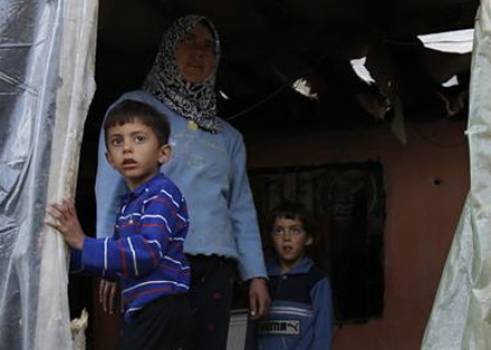By Sarah Marzouk
HelpAge International is extremely concerned about the deteriorating humanitarian situation within Syria, as well as for the refugees who have fled the country. We are particularly worried about the many frail and vulnerable older people who are caught up in the crisis.
Five million people in Syria are thought to be in need of humanitarian assistance and over 678,000 are registered or awaiting registration as refugees in neighbouring countries including Jordan, Lebanon, Turkey and Iraq.
We estimate that well over 300,000 older people inside Syria and among the refugees are in urgent need of humanitarian assistance. The situation is particularly urgent because of the harsh winter conditions.

Major refugee crisis
Before the conflict broke out, over two thirds of people aged 65 and above in Syria were dependant on those able to work to meet their basic needs. Based on previous experience of conflict situations, we are concerned that the on-going crisis will have dramatically increased older people’s levels of isolation, while simultaneously reducing the levels of support that families and communities are able to provide them. The situation dramatically increases older people’s vulnerability and their need for assistance to meet their basic needs.
The conflict in Syria is also causing a major refugee crisis. For example, on 24 January, 4,400 refugees arrived in Za’atri camp in Jordan, and between 1,500 and 1,800 are being registered per day in four registration centres in Lebanon, according to UNHCR.
Data from Za’atri camp shows that 2% of the refugees are aged 60 or over but they account for 7% of the acute health conditions and 21% of chronic health conditions.
Older people disproportionately at risk
This indicates older refugees are disproportionately at risk and in need of humanitarian assistance. Furthermore, the fact that only 2% of the refugee population is aged 60 or over while about 7% of the population of Syria are aged 60 and over suggests that many older people are remaining in Syria.
“These figures tell us many older people are staying behind in Syria because they are unable or unwilling to leave. In emergency situations, older people are often less able or willing to flee quickly to protect themselves from harm,” says Frances Stevenson, HelpAge’s Head of Emergencies.
Those who remain in their homes and those who are internally displaced can struggle to meet their basic needs. With harsh winter conditions, people are facing heavy rains and sub-zero temperatures, many without adequate food, shelter, water or access to medical care. Older people are particular vulnerable in these severe living conditions.
Lack of food and medication
Food is reported to be very expensive with the price of bread eight times higher than before the conflict started. Items such as bottled gas are also in short supply, making it difficult for people to cook or heat their homes. The lack of such goods raises particular concerns for older people, who may find that chronic conditions become debilitating as a result of cold temperatures. Others with mobility challenges may find it more difficult to wait in long queues to buy basic items.
We are particularly concerned about disruptions to older people’s access to healthcare. Chronic diseases such as cardio-vascular disease, chronic respiratory diseases and diabetes are unusually prevalent in Syria, according to the World Health Organization, and affect older people in particular. Untreated chronic conditions can lead to severe complications and it is extremely important older people have regular access to healthcare and medication.
UN response plans highlight vulnerability of older people
The UN has declared a Humanitarian System-Wide Emergency Response for the Syria crisis because of the scale, severity and growing pace of the emergency.
The UN response plans for Syria and the surrounding region highlight the limited activities designed to address the needs of older people and state that vulnerable groups such as older people must be identified and appropriately assisted.
HelpAge International is monitoring the humanitarian needs of older people and working with partner organisations to ensure older people caught up in the crisis receive the humanitarian assistance and protection they urgently need.
